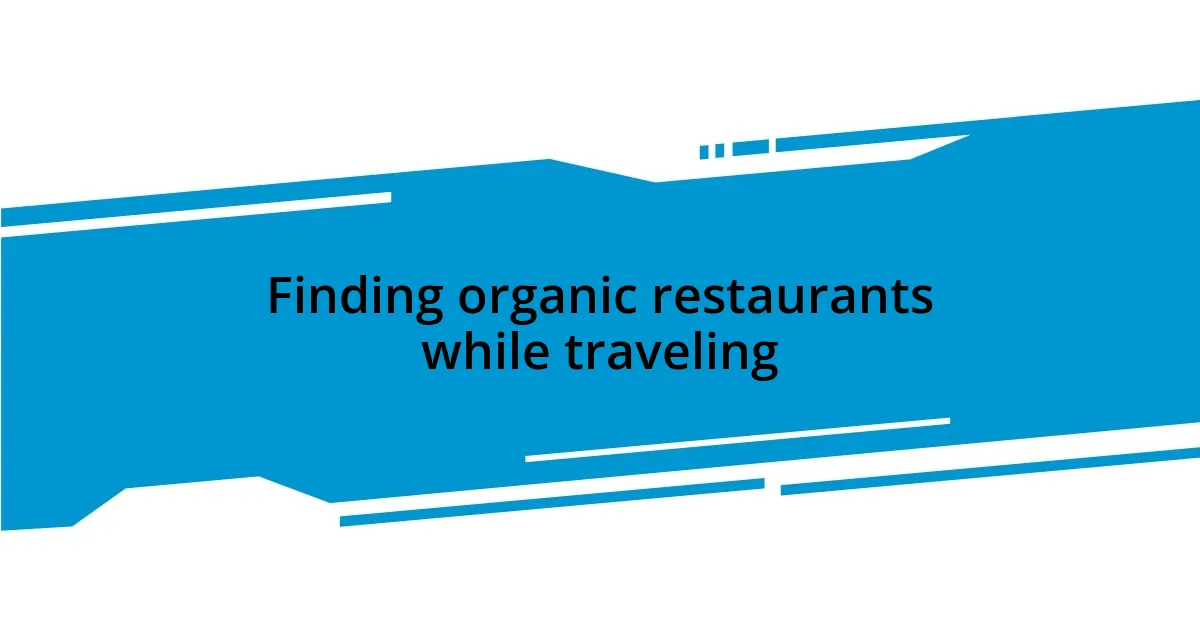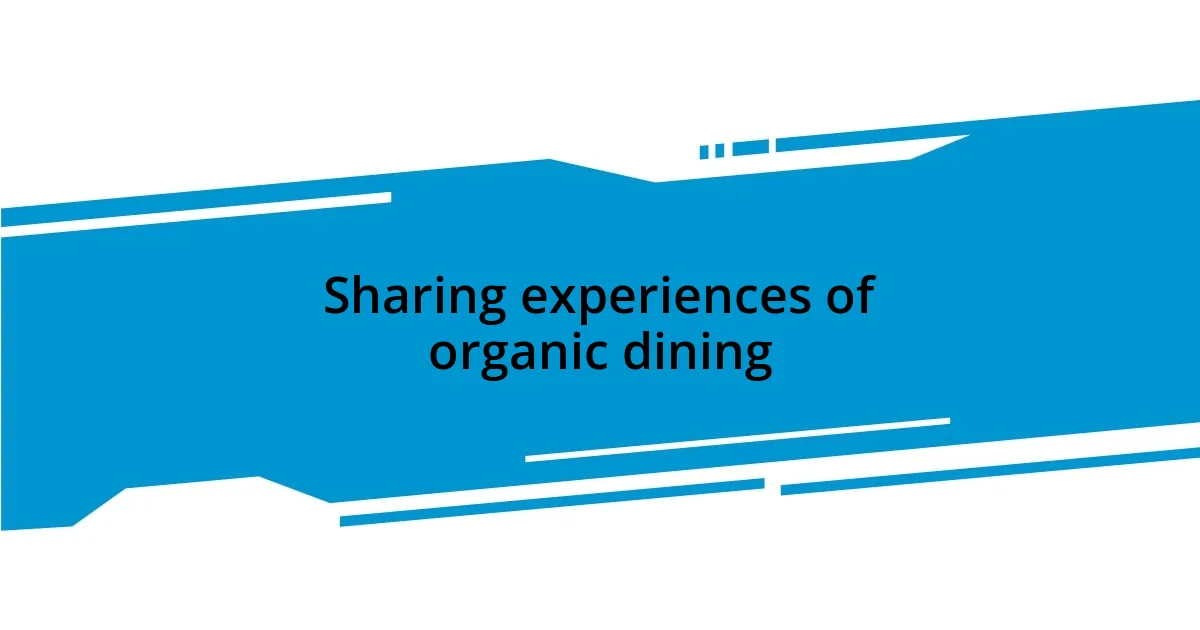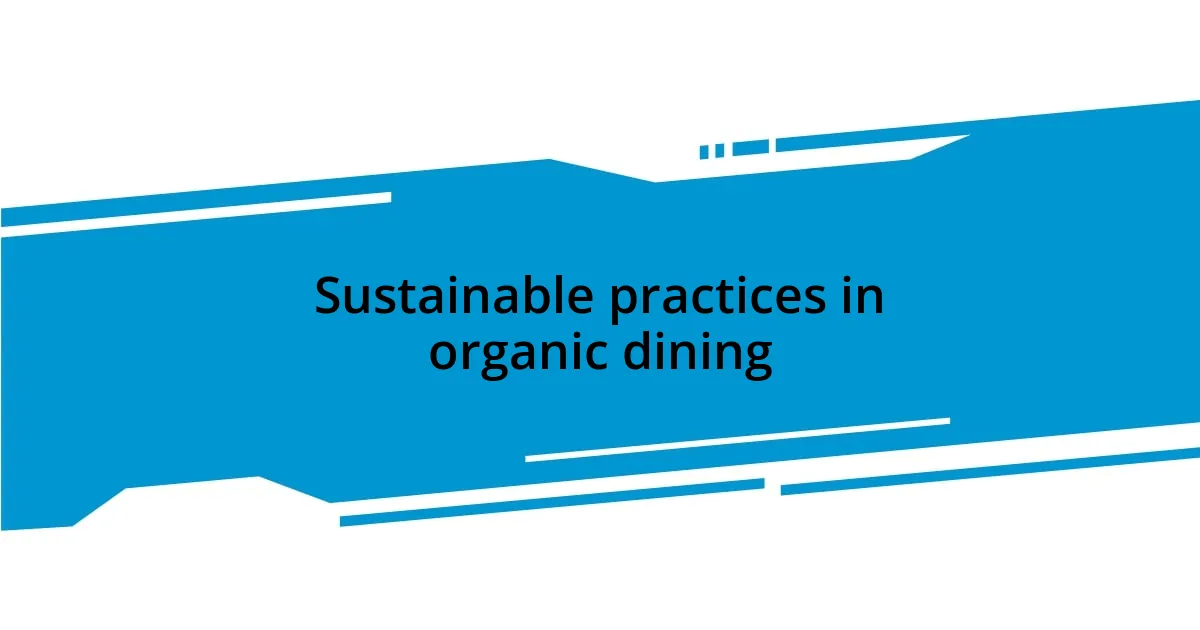Key takeaways:
- Organic dining enhances personal health and supports sustainable agriculture, creating a positive impact on both individual well-being and the environment.
- Finding organic restaurants while traveling involves utilizing apps, social media, and local recommendations, enriching travel experiences with connections to local culture.
- Planning meals around organic options fosters anticipation and allows travelers to embrace seasonal produce, reinforcing connections to local farms and communities.
- Sharing experiences of organic dining promotes conversations about sustainability and culinary traditions, deepening appreciation for the labor behind food and its cultural significance.

Understanding organic dining benefits
One of the most profound benefits of organic dining is its impact on personal health. When I choose organic meals, I often notice a difference in how I feel—both physically and emotionally. Have you ever experienced that rush of energy after enjoying a meal made from fresh, organic ingredients? For me, it’s a refreshing contrast to processed food that can leave you feeling heavy and lethargic.
In addition to personal health, organic dining supports sustainable agriculture. I remember visiting a small organic farm during my travels, where I was struck by the passionate care the farmers put into their crops. It made me realize that by eating organic, I wasn’t just taking care of my body; I was also contributing to that environment. Isn’t it incredible to think that our food choices can have a ripple effect on the planet?
Moreover, the flavor of organic dishes is often unparalleled. I vividly recall a meal I had at a cozy restaurant that prioritized organic sourcing—the tomatoes were vibrant, bursting with sweetness, and every bite felt like a celebration of nature’s bounty. Does anything beat that feeling of savoring food that is both delicious and good for you? Engaging in organic dining not only elevates our meals but also enriches our experiences as travelers, making every bite meaningful.

Finding organic restaurants while traveling
Finding organic restaurants while traveling can sometimes feel like a treasure hunt, but the experience is absolutely worth it. I usually start my journey by diving into online resources like Yelp or Google Maps to discover local organic eateries. Using keywords like “farm-to-table” or “organic” helps narrow the search, and the reviews often give me a real sense of what to expect. It’s like getting the inside scoop from fellow food lovers before I even set foot in a new place.
Here are some tips I’ve found useful for finding organic dining options:
- Apps and Websites: Utilize platforms like HappyCow or OrganicRestaurants.com to locate organic eateries.
- Social Media: Browse hashtags on Instagram or Facebook; locals often share hidden gems.
- Ask Locals: Don’t hesitate to ask locals for recommendations—they’re often the best source for authentic finds.
- Local Farmers’ Markets: Visiting these markets can lead to great restaurant tips and often features stands where you can sample organic goods.
- Look for Certifications: Pay attention to organic seals or labels on menus or storefronts, indicating a commitment to organic sourcing.
On one particular trip to California, I stumbled upon a small organic café tucked in a bustling neighborhood. The moment I walked in, the aroma of roasted vegetables enveloped me. I spoke to the owner, who shared stories about the local farms he worked with. It’s that kind of connection that deepens the travel experience for me. Eating organic isn’t just about food; it often opens doors to fascinating local stories and deeper cultural experiences.

Planning meals around organic options
Planning meals around organic options requires some foresight and creativity, but it’s incredibly rewarding. I often find that reviewing local menus in advance helps me envision the meals I’ll enjoy. During one memorable trip, I pre-planned a week of meals with a focus on organic choices. It turned into an adventure of discovering how each dish could highlight fresh, local ingredients. Don’t underestimate the delight of stumbling upon a hidden organic gem that aligns perfectly with your meal plan.
When constructing an organic meal itinerary, consider the regions you’ll be visiting and their local produce seasons. For instance, dining in areas known for their farms means enjoying fresh harvests and supporting local economies. Once, while traveling through the countryside of Italy, I encountered a family-owned restaurant that proudly highlighted seasonal organic dishes. I can still remember the warmth of the atmosphere as we savored a pasta dish made with just-picked tomatoes and aromatic basil. It was a beautiful reminder that planning around local, organic ingredients not only nourishes the body but connects us deeply to the place we’re exploring.
Flexibility is another key aspect of meal planning around organic options. While I usually map out my food stops, being open to spontaneous choices can lead to delightful experiences. On a particular evening in the mountains of Colorado, I came across an outdoor farmer’s market just as it was closing. The seller offered me some of the day’s leftover organic produce at a discount. The thrill of snagging fresh ingredients inspired an impromptu picnic under the stars, filled with vibrant flavors and a sense of adventure. This experience reinforced my belief that organic dining combined with thoughtful planning and a dash of spontaneity can elevate our culinary journeys to new heights.
| Strategies | Personal Touch |
|---|---|
| Menu Review | Imagining meals in advance increases anticipation. |
| Local Seasonality | Emphasizing fresh produce connects us to local culture. |
| Flexibility | Embracing spontaneous choices can lead to unexpected delights. |

Connecting with local farmers markets
Connecting with local farmers’ markets can truly elevate your travel experience. I remember my visit to a bustling market in Portland, Oregon, where the mix of colors and scents felt almost overwhelming. Freshly picked strawberries, vibrant radishes, and aromatic herbs called out to me, tempting me to explore. There’s something magical about selecting fruits and vegetables that were harvested just hours before. It’s like each item carries a story from the local land, and I couldn’t resist engaging with the farmers, learning about their growing practices, and even picking up tips for my own gardening back home.
While roaming through these markets, I often find myself lost in conversation with passionate vendors. On one occasion, a farmer shared the history of heirloom tomatoes—how they’re not just food but a connection to generations past. That day, I left with a bag full of produce and a few sparkle-eyed recipes I could try later. How often do we get the chance to connect so intimately with the source of our food? It’s that dialogue that makes organic dining feel so authentic, transforming a simple meal into a heartfelt experience filled with local flavor and culture.
Beyond the produce, farmers’ markets often serve as an excellent resource for discovering local dining spots that prioritize the same organic ethos. I can’t recall the number of recommendations I’ve gathered simply by chatting with vendors at various markets. One memorable tip led me to a hidden bistro specializing in farm-fresh dishes, where each bite tasted like it was crafted from the very ingredients I picked out just an hour prior. This kind of connection reinforces my belief that the journey of enjoying organic food starts long before it hits your plate—it begins with the stories and relationships formed at local markets. Isn’t it a joy to eat with that kind of intention and community behind it?

Sharing experiences of organic dining
I’ve found that sharing stories about organic dining often opens up a fascinating dialogue with fellow travelers. One evening in a charming bistro in Costa Rica, I met a couple who had planned their entire trip around tasting local organic dishes. We swapped tales over dinner, and they spoke passionately about how each meal they enjoyed reflected the region’s ecological practices. It was thrilling to connect over shared values around sustainability and health—as if we were part of a larger community united by our love for food that nourishes both the body and the planet.
I can still vividly recall a visit to a small organic farm in Greece, where the owner welcomed visitors with open arms. He took us on a tour, explaining his sustainable farming methods while offering samples of the sun-ripened olives and rich olive oils he produced. The joy in his voice was contagious, and I remember feeling a deep appreciation for the hard work behind each bite I tasted later that night. How often do we pause to consider the labor and love that go into our meals? This experience solidified my belief that when we share organic dining experiences, we’re not just exchanging food—we’re sharing stories, traditions, and a sense of belonging.
Engaging in conversations at these organic spots has also sparked my curiosity about different culinary traditions. I recall a delightful lunch in Mexico, where I chatted with a chef who passionately described the ancient agricultural practices that have influenced his dishes. He prepared a vibrant salad of organic corn and heirloom beans right in front of me, explaining how the flavors told the story of the land. Has a meal ever opened your eyes to a culture in a way you never expected? For me, that moment was a revelation, reminding me that organic dining isn’t just about sustenance; it’s about experiencing life through the lens of each region’s culture, history, and heart.

Sustainable practices in organic dining
Sustainable practices in organic dining extend far beyond simply choosing the right ingredients. During my travels, I’ve frequented restaurants dedicated to zero-waste policies. I remember dining at one in Naples where the chef creatively utilized every part of the vegetables. It felt profound to witness food scraps transformed into flavorful broths and garnishes. Isn’t it inspiring to realize that thoughtfully using ingredients can create not just delicious meals but also respect for the earth?
I’ve also come to appreciate the impact of seasonal menus. At a quaint café in the Pacific Northwest, everything was locally sourced and adjusted with the seasons. It created an intimate relationship with the land, as each dish told the story of what was fresh that week. I often think back to the wild mushrooms featured in a risotto that practically melted in my mouth. It made me wonder: how can we mimic this connection at home? It’s a gentle reminder that eating seasonally doesn’t just enhance flavor; it encourages mindfulness about our choices.
And let’s not overlook the beauty of community-supported agriculture (CSA) programs. During a summer in Vermont, I joined a CSA where I received a weekly box of organic produce directly from a local farm. Each delivery was a delightful surprise, filled with vibrant fruits and vegetables I had never tried before. It felt fulfilling to support local farmers while exploring new culinary adventures. Have you ever tried veggies fresh from the farm? Trust me, the taste is something you won’t easily forget! Embracing such sustainable practices in organic dining not only nourishes our bodies but also nurtures our planet and local communities.
















